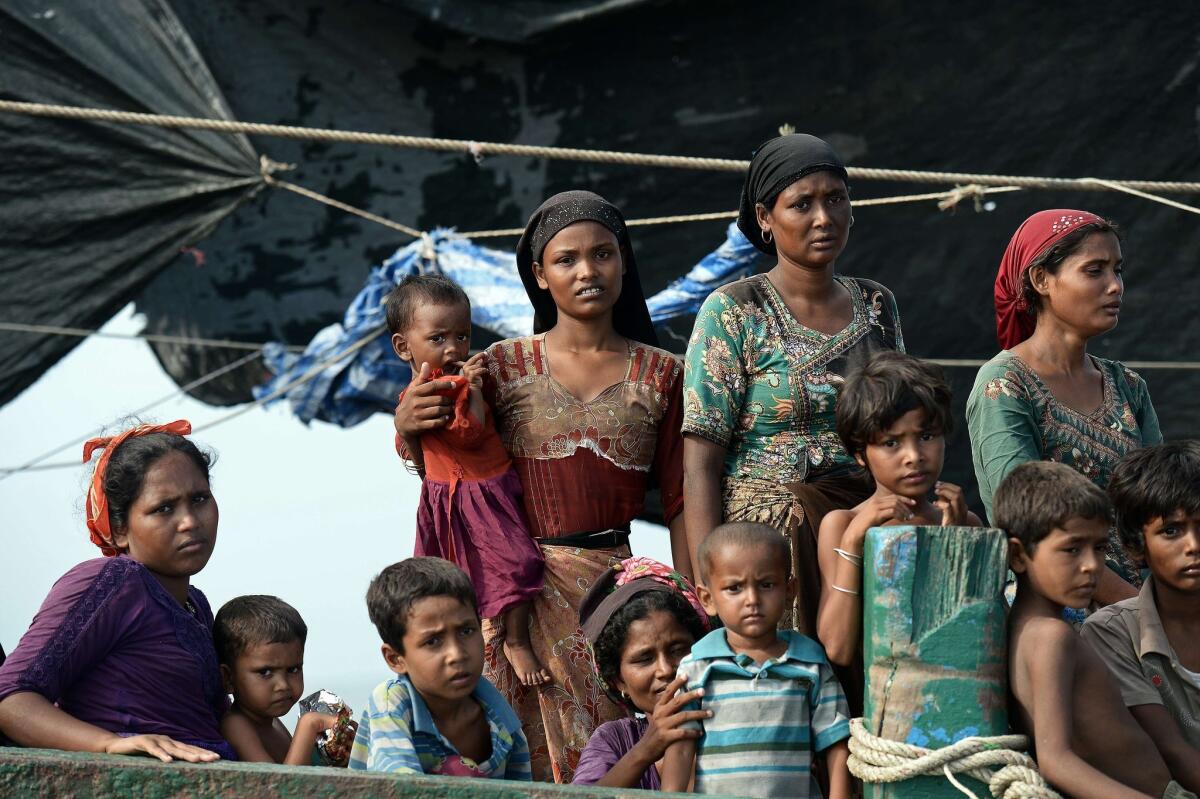Opinion: The persecuted Rohingya people of Burma are in a new peril -- at sea

Rohingya migrants stand and sit on a boat drifting in Thai waters off the southern island of Koh Lipe in the Andaman sea on May 14.
- Share via
The plight of the Rohingya of Burma seems only to get more harrowing. A harshly persecuted and impoverished Muslim minority in a Buddhist majority country, they are stateless, deprived of rightful citizenship by the Burmese government, restricted in where they can live and work. Most of the 1 million Rohingya live in Myanmar’s western Rakhine state; an estimated 180,000 of them were driven from their homes by sectarian violence and ended up in squalid displaced-persons camps.
Now, thousands of Rohingya are stranded in boats at sea in Southeast Asia without adequate food, water or sanitation -- prey to vicious smugglers. All are seeking asylum in other countries. None of the places they end up are welcoming. According to Human Rights Watch officials, when one boat showed up on Indonesian shores, officials did provide food and water -- before directing the boat to Malaysia, which announced it would turn back all boats. Similarly, Thailand said it would offer fuel, food and water -- before turning boats away. The boat exodus has been going on all year but the latest surge follows last month’s action by the Burmese government to take away the temporary ID cards it issued to the Rohingya.
So much for that diplomatic friendship that the U.S. extended in 2012 to Burma -- including two trips there by President Obama -- in an effort to get the country further down the path toward human rights reform. No such thing for the Rohingya.
At the very least, boats of desperate and often ill people seeking asylum should not be turned away from any shores. They should be allowed on shore for food and medical treatment. It’s an international predicament, but it can’t be dismissed by simply sending back boats into the ocean to their next port of call. If anything, Thailand, Malaysia and Indonesia should work together on a solution and “stop playing a three-way game of human ping pong,” as Phil Robertson, deputy Asia director at Human Rights Watch, put it.
But this is, unquestionably, a crisis caused by the Burmese government and its appalling treatment of a segment of its own population whom it treats as intruders. The call for reforms -- from the U.S., the United Nations, human rights organizations -- is not the world interfering in Burma’s affairs, it’s the world demanding Burma to stop human rights abuses.
And the U.S. needs to be more forceful in that message. Last November, when Obama visited Burma, he met with Aung San Suu Kyi, the Nobel Peace Prize winner and former political prisoner who has been a crusader for democracy in the country. Although not so much on behalf of the Rohingya. Obama and Suu Kyi were all hugs and kisses at her lakeside home, with the president diplomatically suggesting she speak out more forcefully on behalf of the Rohingya. Obama’s deputy national security advisor, Ben Rhodes, was quoted in an L.A. Times story on the meeting saying that Suu Kyi has a way of holding “everybody’s feet to the fire.”
She should start with her own feet. It’s past time for Suu Kyi to use her moral authority to denounce the Burmese government’s treatment of the Rohingya and push strongly for reforms. Her reticence to do so is disturbing and frustrating -- she could wield the kind of internal influence that the U.S. will never be able to muster. That said, it’s also time for the U.S. government to get tougher with Burma on this issue.
Follow the Opinion section on Twitter @latimesopinion and Facebook
More to Read
A cure for the common opinion
Get thought-provoking perspectives with our weekly newsletter.
You may occasionally receive promotional content from the Los Angeles Times.










